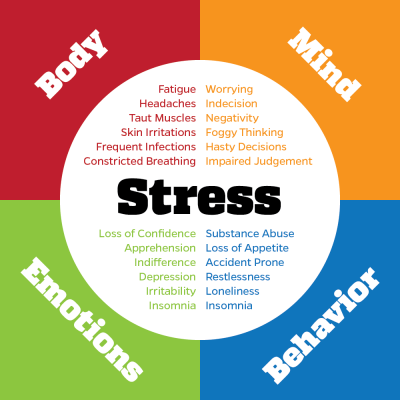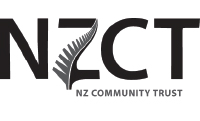For many of us, life always seems busy in one way or another. We can easily get overwhelmed if we aren't taking the time to look after ourselves. Here are some of our ideas and tips to help relieve some stress and boost your relaxation.
On this page:
- The body's response to stress
- Caring for your Hinengaro (psychological health)
- Sleep hygiene
- Mindfulness & meditation
- Drink responsibly
1. The body's response to stress
Stress is our body’s natural reaction to any kind of excess demand or threat. Stress can come from many sources such as health issues, relationship problems, work, paying the bills, deadlines, exams, or even unrealistic expectations we put on ourselves.
The effects of stress are vast as you can see below, but chronic stress can also contribute to high blood pressure, diabetes, depression or anxiety, heart disease, muscle tension, headaches, and irritable bowel disorder.
Stress is a normal part of our lives but if it has reached the point where you are feeling overwhelmed and are finding it hard to relax, then it might be time to reflect and put in some time for self-care. Check out our ideas for caring for yourself and your hinengaro.

Back to the top
2. Caring for your hinengaro (psychological health)
Just like we care for our physical health, we must look after our psychological, mental, and emotional health too. What tools we use will be different for each of us, so here's a list to start exploring. You may want to grab a notebook or note pad and write down what might and already work for you. Keep this book close or stick the paper up in your room for a visual reminder. If you're handy on a cell phone, check out the new Mentemia (a new New Zealand based app), Blueprint recommends some online tools too.
Note that different types of stress or different emotions may need different tools to help you cope, so be flexible and have a few ideas up your sleeve. The Mental Health Foundation have put together Five Ways to Wellbeing:
-
Connect, me whakawhanaunga - this may include connecting with a counsellor
-
Give, tukua - do something you're good at
-
Take notice, me aro tonu - have you tried gratitude journaling? this can help lift mood by putting things into perspective
-
Keep learning, me ako tonu - give mindfulness & meditation a go, we've recommended some apps below
-
Be active, me kori tonu - care for your tinana
Back to the top
3. Sleep hygiene
Sleep plays a vital role in our wellbeing. By practising healthy habits you are more likely to have good quality nights rest which supports your body's optimal functioning. These habits may be having a routine at night, turning off the blue lights on your screens (or setting a screen timer), and making sure you have some activities which can help ease you into a restful state. Here are some tips from the Ministry of Health and below are their sleep hours recommendations.
| Age: | 0-2 months | 2-12 months | 12-18 months | 3-5 years | 5-12 years | Adolescents | Adults |
| Hours needed: | 10.5-18.5 | 14-15 | 13-15 | 11-13 | 9-11 | 8.5-9.5 | 7-9 |
If you are interested in monitoring your sleep, take a look at this sleep journal from the Sleep Council UK, and their other resources like the ones below.
Back to the top
4. Mindfulness & meditation
Being present, making time and creating space for yourself isn't something many of us do on the daily. But it is super beneficial for our stress levels, mood and how we respond to life events. This website, Mindful, is stacked with information and articles. Otherwise, check out the apps we've recommended below to get you started with mindfulness and meditation:
It starts with taking just two minutes out of your day, away from your desk, turning your TV off, just sitting or lying in a comfortable space. Take your time with it, continue to practice, even if it's only 5-10 minutes, and notice the benefits grow.
Back to the top
5. Drink responsibly
Alcohol is part of many New Zealanders’ lives. There is no amount of alcohol that is considered safe and drinking any alcohol can be potentially harmful. You can find out about the Ministry of Health's recommendations for alcohol here. If you're wanting to check whether your drinking is normal, or how to talk to someone about alcohol, check out Cheers.org.nz below.










